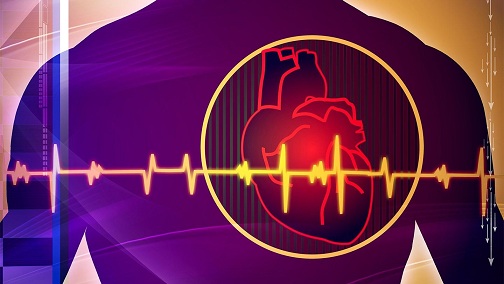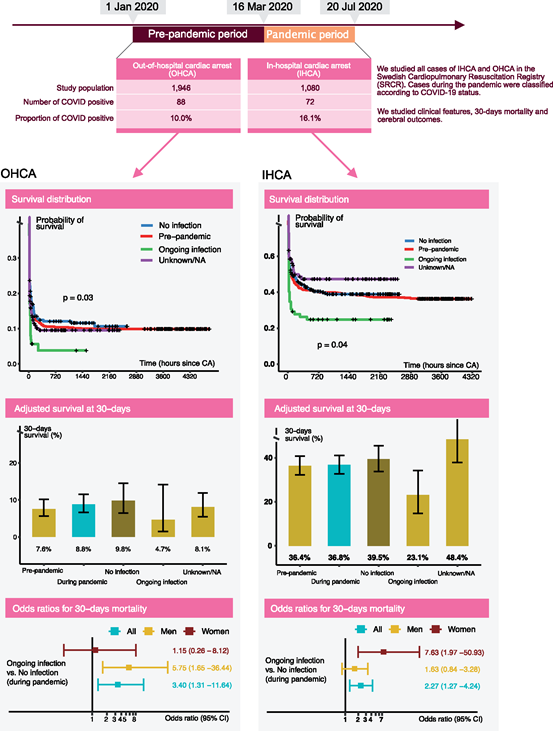COVID-19 Research: Swedish Study Shows That COVID-19 Patients Have Higher Mortality From Sudden Cardiac Arrest
Source: COVID-19 Research Feb 08, 2021 4 years, 10 months, 3 weeks, 6 days, 18 hours, 15 minutes ago
COVID-19 Research: A new study by Swedish researchers from the University of Gothenburg, Uppsala University, Sahlgrenska University, Karolinska Institutet, Lund University, and Halland Hospital-Sweden shows that sudden cardiac arrest is more often fatal in people with COVID-19.

The medical scientists initiated the research to study the characteristics and outcome among cardiac arrest cases with COVID-19 and differences between the pre-pandemic and the pandemic period in out-of-hospital cardiac arrest (OHCA) and in-hospital cardiac arrest (IHCA).
The study team included all patients reported to the Swedish Registry for Cardiopulmonary Resuscitation from 1 January to 20 July 2020. They defined 16 March 2020 as the start of the pandemic. The team assessed overall and 30-day mortality using Cox regression and logistic regression, respectively. We studied 1946 cases of OHCA and 1080 cases of IHCA during the entire period. During the pandemic, 88 (10.0%) of OHCAs and 72 (16.1%) of IHCAs had ongoing COVID-19. With regards to OHCA during the pandemic, the odds ratio for 30-day mortality in COVID-19-positive cases, compared with COVID-19-negative cases, was 3.40 [95% confidence interval (CI) 1.31–11.64]; the corresponding hazard ratio was 1.45 (95% CI 1.13–1.85). Adjusted 30-day survival was 4.7% for patients with COVID-19, 9.8% for patients without COVID-19, and 7.6% in the pre-pandemic period. With regards to IHCA during the pandemic, the odds ratio for COVID-19-positive cases, compared with COVID-19-negative cases, was 2.27 (95% CI 1.27–4.24); the corresponding hazard ratio was 1.48 (95% CI 1.09–2.01). Adjusted 30-day survival was 23.1% in COVID-19-positive cases, 39.5% in patients without COVID-19, and 36.4% in the pre-pandemic period.
The study findings concluded that during the pandemic phase, COVID-19 was involved in at least 10% of all OHCAs and 16% of IHCAs, and, among COVID-19 cases, 30-day mortality was increased 3.4-fold in OHCA and 2.3-fold in IHCA.
The study findings were published in the peer reviewed European Heart Journal.
https://academic.oup.com/eurheartj/advance-article/doi/10.1093/eurheartj/ehaa1067/6128749?searchresult=1
The study team sees the results as a wake-up call for the public and care providers alike.
The detailed study covers all 3,026 cases of sudden cardiac arrest that were reported to the Swedish Registry for Cardiopulmonary Resuscitation in the period from 1 January to 20 July 2020 that is, both before and during the pandemic.
The Swedish Registry for Cardiopulmonary Resuscitation Registry's statistics show that there are 6,000 cases of sudden cardiac arrest annually in which the person is not admitted to hospital. Some 600 of these people survive. The corresponding figures for cardiac arrest during inpatient care are 2,500 cases and 900 survivors.
The detailed study findings indicate that mortality from sudden cardiac arrest is higher if the person has COVID-19, but that different patient groups show divergent differences in mortality rates.

/>
Eur Heart J, ehaa1067, https://doi.org/10.1093/eurheartj/ehaa1067 © The Author(s) 2021. Published by Oxford University
It was found that during the study period, 1,946 cases of sudden cardiac arrest outside of hospitals were registered. In 10 percent of the cases in this group, the person had COVID-19, and the risk of a fatal outcome proved to be 3.4 times higher for these people than for the other group members.
Importantly of the 1,080 cases of sudden cardiac arrest that took place in hospitals, COVID-19 was present in 16 percent. Among the patients with COVID-19, mortality was 2.3 times higher than for the others in this group.
Significantly the largest mortality difference was noted in the group of women who were already receiving inpatient care at the time of their cardiac arrest. In these women, ongoing COVID-19 infection was associated with nine times the risk of a fatal outcome during the initial months and a sevenfold risk from April onward.
The research carried out by researchers at the Swedish Registry for Cardiopulmonary Resuscitation and the University of Gothenburg, received financial support from the Swedish Heart-Lung Foundation. This Foundation's prompt funding action was crucial for the implementation, emphasizes Dr Araz Rawshani, registrar and researcher at the Faculty of Medicine, Sahlgrenska Academy, who also works at Sahlgrenska University Hospital.
Dr Kristina Sparreljung, the Secretary-General of the Swedish Heart-Lung Foundation told Thailand Medical News, “We hope our results can help to raise awareness of COVID-19 complications among the public, care providers, and decision-makers. That could improve care and mobilize resources for high-risk patients."
She further added, "We hope these results will help to enable more lives to be saved. This study is a direct result of the emergency grant provided by the Heart-Lung Foundation for research on COVID-19 connected with cardiopulmonary disease back in spring 2020.”
Interestingly the survival rate for cardiac arrest has risen successively in recent years, but mortality remains high. Surviving a sudden cardiac arrest outside of hospital requires, pending arrival of an ambulance, immediate action in the form of cardiopulmonary resuscitation (CPR) and use of an automated external defibrillator (AED).
For the latest
COVID-19 Research, keep on logging to Thailand Medical News.

 />
/>